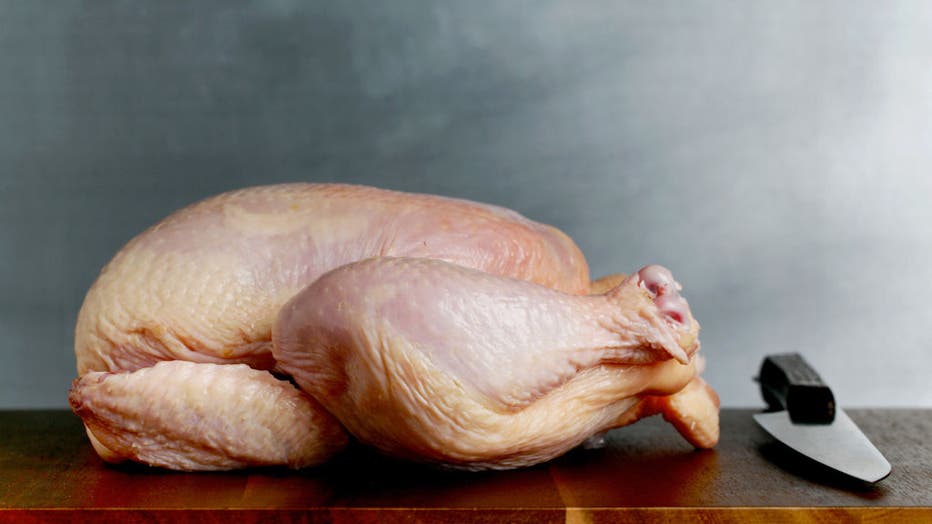Bought chicken over last decade? You could be eligible for settlement payment
People who bought chicken products in the United States over the last decade could be eligible to receive payments as part of a class-action settlement totaling $181 million.
Prosecutors in a class-action lawsuit called Broiler Chicken Antitrust Litigation allege that a number of corporations, including Fieldale, Mar-Jac, Pilgrim’s and Tyson, "conspired to restrict the supply of, and fix, raise, and stabilize the price of chicken," which is a violation of federal and state consumer and antitrust laws. The defendants have denied the allegations.
A legal notice authorized by the U.S. District Court for the Northern District of Illinois was posted Friday by the law firm representing the plaintiffs in the case. It states anyone who purchased chicken in the country from Jan. 1, 2009, through Dec. 31, 2020, in several different U.S. states could be eligible to receive money — pending final approval by the court.
A hearing is scheduled for 9 a.m. on Dec. 20, 2021, to consider final approval on the settlement agreements.
Those eligible include any person or entity who purchased fresh or frozen raw chicken, whole cut-up birds purchased within a package, or "white meat" parts including breasts and wings. Chicken marketed as halal, kosher, free-range or organic is excluded from this settlement.
Eligible states include California, District of Columbia, Florida, Hawaii, Illinois, Iowa, Kansas, Maine, Massachusetts, Michigan, Minnesota, Missouri, Nebraska, Nevada, New Hampshire, New Mexico, New York, North Carolina, Oregon, Rhode Island (after July 15, 2013), South Carolina, South Dakota, Tennessee, Utah and Wisconsin.

FILE - A whole raw chicken is pictured in an undated file image taken in Washington, D.C. (Photo by Deb Lindsey For The Washington Post via Getty Images).
Fieldale Farms Corporation, George’s, Mar-Jac Poultry, Peco Foods, Pilgrim’s Pride, and Tyson Foods were named as defendants in the settlement. The companies have all denied any wrongdoing.
The total payout is still being determined. Consumers are urged to check their eligibility and submit a claim online by Dec. 31, 2022, at www.overchargedforchicken.com or by calling 1-877-888-5428.
Last week, Tyson Foods and Perdue Farms agreed to settlements of nearly $35 million in a lawsuit that also accused them and several other firms of conspiring to dominate the industry and fix the prices paid to farmers who raise the chickens, according to the Associated Press.
The poultry companies agreed to the settlements without admitting any wrongdoing while the lawsuit remains pending against several other industry giants, including Pilgrim’s Pride, Koch Foods and Sanderson Farms. The lawsuit, filed by Alabama farmers in Oklahoma federal court, alleges that the contract grower system the meat companies created pushed the farmers deep into debt to build and maintain chicken barns that met company standards.
They also said the companies colluded to fix farmer compensation at low levels to boost corporate profits, making it difficult for the farmers to survive financially. Generally, chicken producers enter long-term contracts with meat companies that farmers say lock them into deals that fix their compensation at unprofitably low levels.
The farmers who sued reported earning between $12,000 and $40,000 a year while working 12-to-16-hour days all year long while major meat companies like Tyson and Pilgrim’s were reporting annual profits over $1 billion.
Chicken nugget launched into space to celebrate supermarket’s anniversary
A British supermarket chain celebrated its 50th anniversary by sending a chicken nugget into space.
Previously, major meat companies have defended the system as fair; it calls for farmers to provide barns and labor to raise chickens while the companies provide chicks, feed and expertise. Industry officials have said the contract system has worked for six decades because it benefits companies and farmers.
Perdue Farms spokeswoman Diana Souder said the company, which will pay $14.75 million, values the relationship it has with its farmers and Purdue pays farmers based on their performance.
"As an imperative lifeblood of our business, we value the excellent relationships built on trust we have with our farmers, and remain committed to providing them fair, competitive contracts that benefit them and, therefore, our animals, company, customers, and consumers." Souder said
Tyson, which agreed to pay $21 million in the settlement, decided it was in the best interests of the company to eliminate the uncertainty, risk, expense and distraction of extended litigation, spokesman Derek Burleson said.
The Biden administration has said it plans to issue new rules encouraging competition in the agriculture sector and protecting farmers against the country's largest meat processors, including making it easier for farmers to sue companies they contract with over unfair, discriminatory, or deceptive practices.
This story was reported from Cincinnati. The Associated Press contributed.

